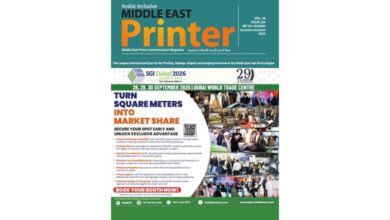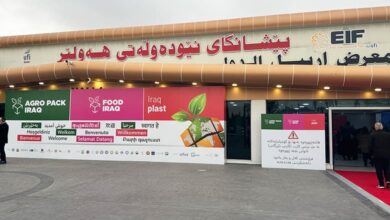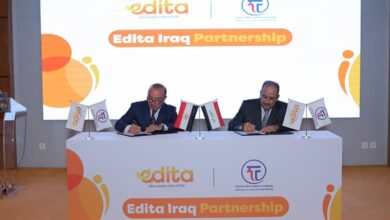Iraq From Bomb To Boom
The splurge in investment levels by Iraqi printing presses, in recent times, denotes the fact that the printing industry is back on track. In 2012 the country witnessed many printers going big by investing in equipments and facility. Many deals were signed during this period and according to unofficial statistics, about 500 presses are shaking up the dust of the war and coming back into the limelight.
As one of the first press manufacturers, that envisioned Iraq will inevitably develop a lucrative printing and packaging market, Heidelberg committed itself to Iraq right after the fall of Saddam Hussein. Amidst uncertainties and while the dust had yet to settle after a bloody war, Heidelberg kept a high profile in Iraq’s printing community. Now it seems that the company’s gamble is paying off.
Despite all the bad news still coming out of Iraq, many people believe the country is fertile ground for investment, do you agree?
Yes, there are gradual and significant improvements happening in Iraq. The security in the country has improved, especially the chaos that resulted after the war of 2004. The Iraqi printing market has been showing signs of improvement and we hope that the situation will continue in the coming period.
Though the country has gone through a bad situation, it’s not to be forgotten that Iraq is an oil rich country and has the potential to grow. During the eighties, Iraq was one of the strongest printing markets in the region, to such an extent that it competed with the Saudi printing market of that time. All of this shows the capabilities of the printing market and the expertise of its work force.
An important factor that emerged at recent times has also created a positive effect on the printing market. It was the decision of major printing presses to do their entire printing works within the country and not to outsource it. This decision has reflected positively on the printing market.
So printers are also joining the investment bandwagon?
Yes, currently printing textbooks as well as trade publications constitute the largest proportion of the printing jobs done in Iraq. We believe that packaging equipments will have a major role to play in the future, and I think that this trend will replace the interest of Iraqi printers, who will now start to focus and invest on opportunities based on the industrial potential of the country.
If it’s about the offset-digital divide, Iraqi printers still prefer offset presses and are rather reluctant to venture into the digital side. However recently there is some movement on the digital side, with some investing on digital printers.
What about the challenges faced?
There are a lot of challenges that Iraqi printers have to face in the market including security issues. I still remember when we were asked to deliver a certain quantity of paper to one of our customers in Iraq, and we were surprised when the insurance and transfer cost came higher than the paper cost itself. We have to find a solution for this problem; otherwise the industry won’t thrive in the country.
It’s also quite difficult to access technical knowhow and foreign expertise because of the existing laws in Iraq. We also avoid selling UV machines because of the complexities involved (installation, maintenance and training procedure), all of which are difficult to be fulfilled in Iraq under the current working condition. Lack of transparency in dealings is also an issue to be dealt with.
I guess Heidelberg had to endure many adversaries to work in these unfavourable conditions, how is your performance now?
Our performance is good, and it indicates the improved situation in Iraq. To achieve something in Iraq is a time consuming affair, and the stringent rules in the country delay the completion of any project undertaken. We have adapted ‘patience’ in our management policies, especially when it comes to the adoption of long-term strategies in order to achieve the desired goals. So, if we check our performance over a couple of year’s time, I would say that it was certainly rewarding.
What sort of impact Arab Spring had on printing industry?
Contrary to our expectations, it had a positive effect on the printing market. Iraq’s neighbouring countries like Syria, Lebanon, Jordan, Iran and even Egypt were taking out a major part of the publications from Iraq, especially textbooks. Uncertainties in these countries led Iraqi printers to develop their own capabilities and invest heavily in printing equipments in order to implement publications within the country. This trend reflected positively in the printing market, especially in the area of sheetfed and web printing, which is seeing significant development these days.
Then I can assume that when the conditions became more favourable you had the resources and infrastructure to reap the benefits and grab a sizable market share?
Yes. However it is difficult to say an exact figure, as the Iraqi market handles a lot of sectors. Though, in the sheetfed market, Heidelberg has a share of 70 to 80 per cent.
That’s a staggering number. How did you achieve that?
We periodically visit our customers to know their requirements and have worked hard to meet their requirements. Even during difficult times we provided the market with our products and services through our distributors in Iraq. This measure has given some sort of reassurance to our customers about the strong presence of Heidelberg and its ability to provide services even in the hardest circumstances.
Heidelberg has been successful because our products are well suited to the demands of the market, and due to our ability to provide after sale services. Out there in the market there are printing machines, which are more than 10 years old and in spite of that we provide spare parts and maintenance support for these machines. This has reflected positively in building up our image amongst the clients.
But how do you interact with your customers on daily basis? As far as we know you don’t have an office in Iraq.
We are in constant contact with our local distributors and I personally visit them and remain updated on their requirements of the printing presses. We bring engineers from Saudi Arabia, United Arab Emirates and Lebanon to install machinery and train the technicians here. We rely on our distributors in the market and offer them the necessary resources to support and meet the requirements of the market.
We always maintain our credibility by signing deals that we are sure to fulfil. Heidelberg Iraq has refused a lot of deals because we knew that we can’t possibly fulfil them either due to security conditions or other reasons.
Last but not least, what do you think the future holds for Heidelberg in Iraq?
Heidelberg aspires to have a direct presence in the market and work as ‘Heidelberg Iraq’, just like Heidelberg Gulf and Heidelberg Lebanon. But trading conditions are still unfavourable. We hope that the day will come when we will have a qualified team, which will drive the printing industry forward in the country. We at Heidelberg are always optimistic about the future, especially about the Iraqi market. We expect an improvement in the Iraqi market over the next three years, given that the political and economic situation improves.
We are also working through our cooperation with several distributors in Iraq in terms of marketing Heidelberg products.






